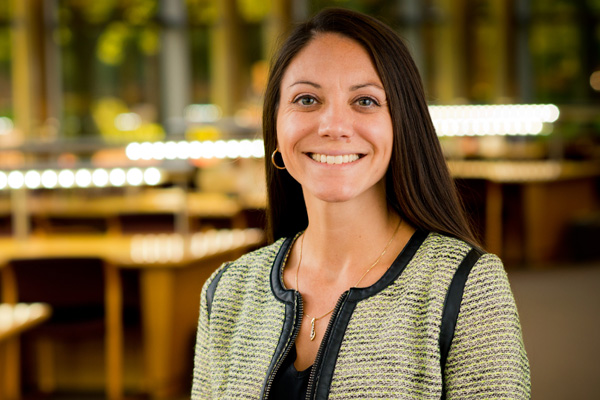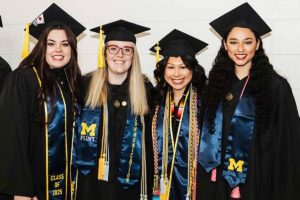Kimberly Bender, PhD, joined the UM-Flint College of Arts & Sciences in Fall 2016 as an assistant professor of criminal justice.

Read below to learn more about her and the field of criminal justice, or join her in one of her Winter 2017 classes:
- CRJ 185 – Introduction to the Criminal Justice System
(MW, 11am-12:15pm) - CRJ 388 – Corrections: A Critical Perspective
(W, 5:30pm-8:15pm) - CRJ 430 – Processing Offenders (MW, 4pm-5:15pm)
Students can register now at sis.umflint.edu or find more information at umflint.edu/register.
Why are you passionate about your field?
The criminal justice field is one in which real, significant differences can be made. It is a field in which those who hold more power or status can create time and space for marginalized individuals to be heard. I feel honored that I have the ability to create that time and space and be the facilitator of much needed conversations. I often tell the women in prison whom I interview that they are the real change-makers. It is their experiences and the experiences of other men and women in the criminal justice system that need to be heard in order to begin making the much needed improvements.
What are your favorite courses/subjects to teach?
I find the Introduction to Criminal Justice course exciting to teach because it is one of the first classes that a criminal justice student takes. Students in the Intro class are usually full of questions and thoughts about the criminal justice system. As a teacher, one of the most exciting parts of the job is watching “the lightbulb go off.” I love when students begin to think about an idea or issue in a completely different way than they did when they first stepped foot into the classroom. For me, this is what learning is all about: showing students additional ways of thinking.
Corrections is another class I enjoy teaching very much. I am able to bring a great deal of my research into the classroom to share with the students. Rather than reading from a textbook, I can provide real life stories from men and women who have lived the prison life and who have experienced the major challenges of reintegrating into society.
What is your latest or favorite research project?
The latest research project I am working on uses in-depth interview data collected from 100 Baltimore City residents and protesters who shared their personal experiences and observations of the police prior to Freddie Gray’s death. The study explores if and how race and gender intersect with citizens’ strategies during their encounters with Baltimore police. Findings have implications as to how men and women across race make sense of police actions and how citizens manage their interactions with the police.
How did you fall in love with your discipline?
I was a 19 year old undergraduate student majoring in Psychology at Ohio University. I took a class, “Psychology of Justice,” and on one particular day the professor held a book up. The front cover of the book resembled a yearbook with its 45 individual headshots. That day I learned all about wrongful conviction. Those 45 faces on the cover of the book were faces that had been exonerated through the innocence project. That class was so powerful for me that I went on to double major in criminal justice and further pursue my education.
What do you hope for your time at UM-Flint?
I understand that change does not always happen overnight nor does it always happen in big ways. However, if I can make any sort of positive change or difference in the lives of the students, the university and the community I will have been successful during my time at UM-Flint. I also hope to make strong and lasting connections with the students and faculty as well as the surrounding community.
What do you hope for students in your field?
It is my hope that criminal justice students use the knowledge that they learn in the classroom and apply it not only to their jobs, but to their everyday lives. I hope that they will use their knowledge and position to create a more equitable society and criminal justice system. A student recently told me that he believed he would be a better police officer after taking a Gender, Race, and Crime course that I taught. I see the classroom as a forum for discussing sensitive issues that are not often talked about in everyday life, but most definitely need to be discussed.
What are three things you think people should know about you?
Ever since I can remember, I wanted to teach. I did not know what I wanted to teach or who I wanted to teach, but I did know that being in the classroom conveying knowledge to others was something I could not live without.
A fun fact about me is that I am originally from Connecticut, but over the course of my life I spent many summers in Michigan with family and every November my family and I would drive to Detroit for the Detroit Lions’ Thanksgiving Day football game. Thus, I am and will always be a diehard Detroit Lions fan.
Lastly and most importantly, my door is always open to anyone who has questions, needs advice, or who just wants to chat.
To learn more about criminal justice at UM-Flint, visit umflint.edu/sac. To register for winter courses, visit sis.umflint.edu or umflint.edu/register.




